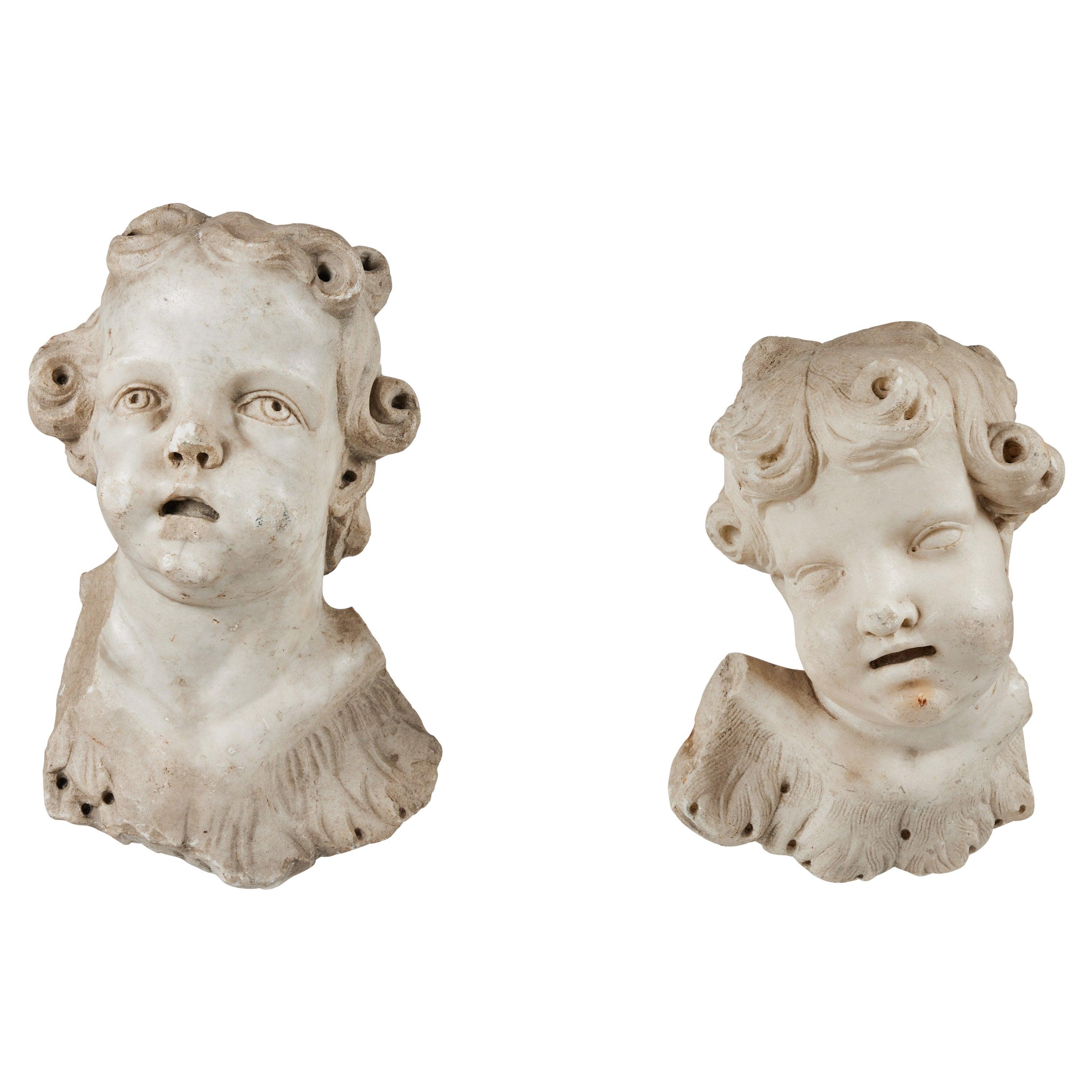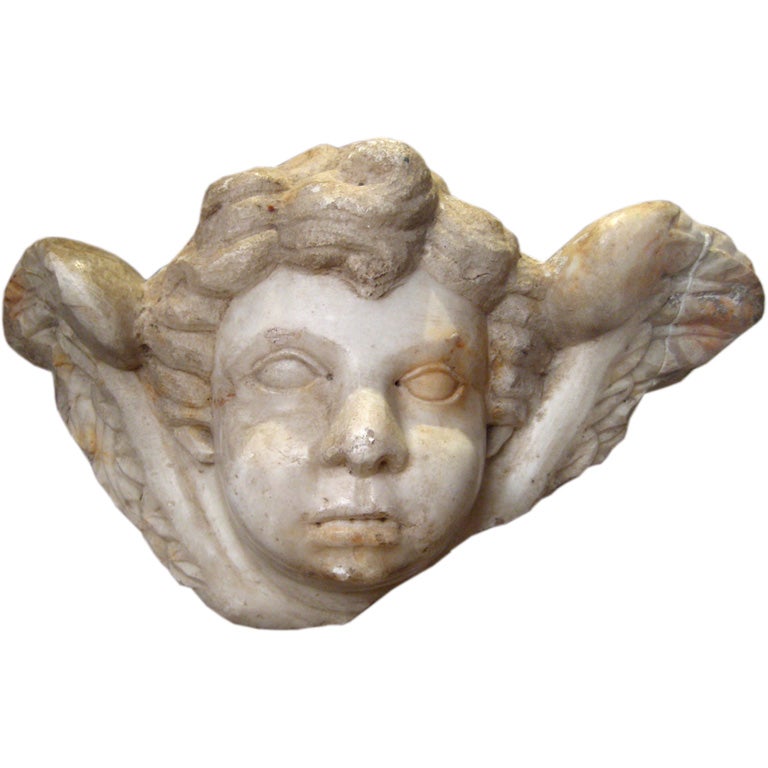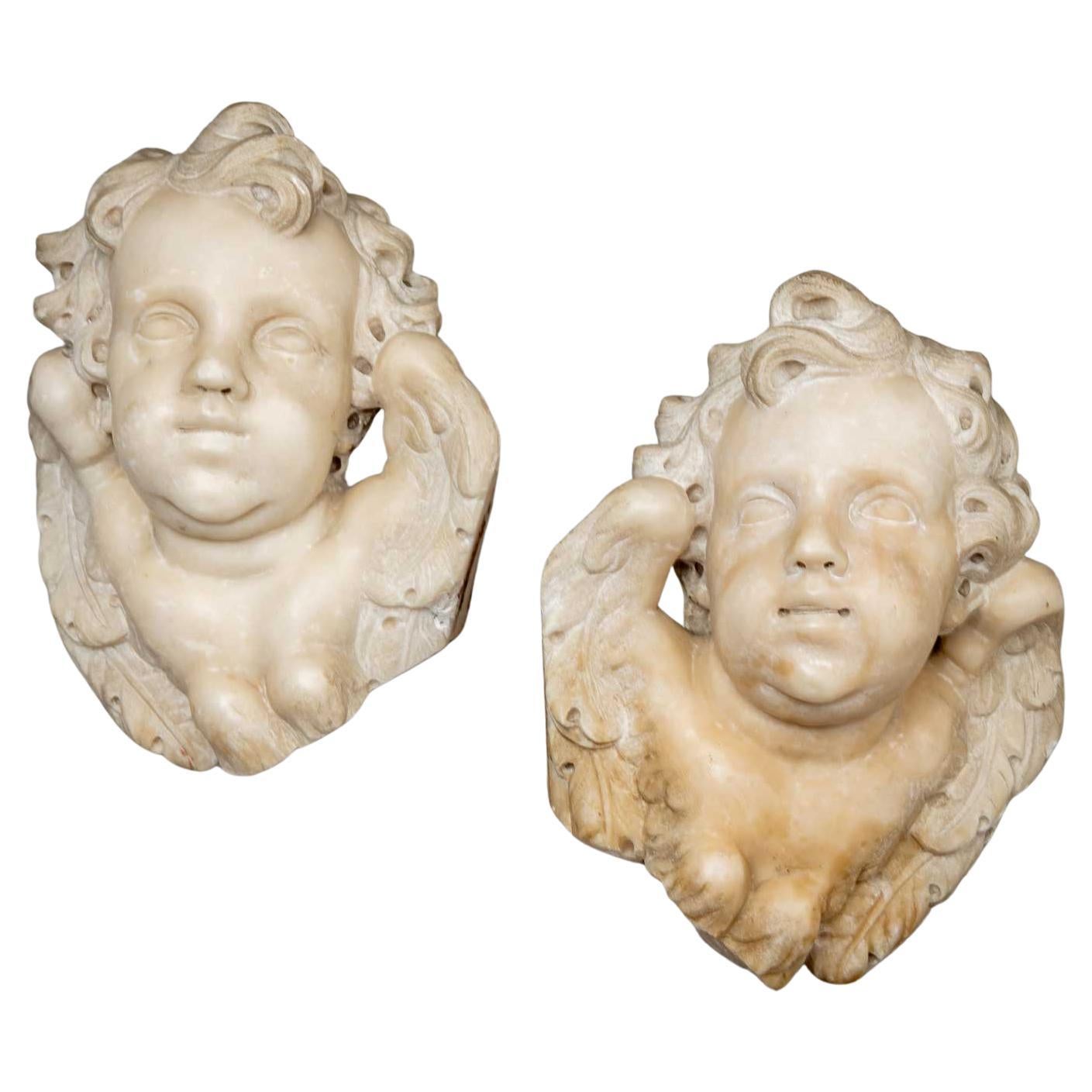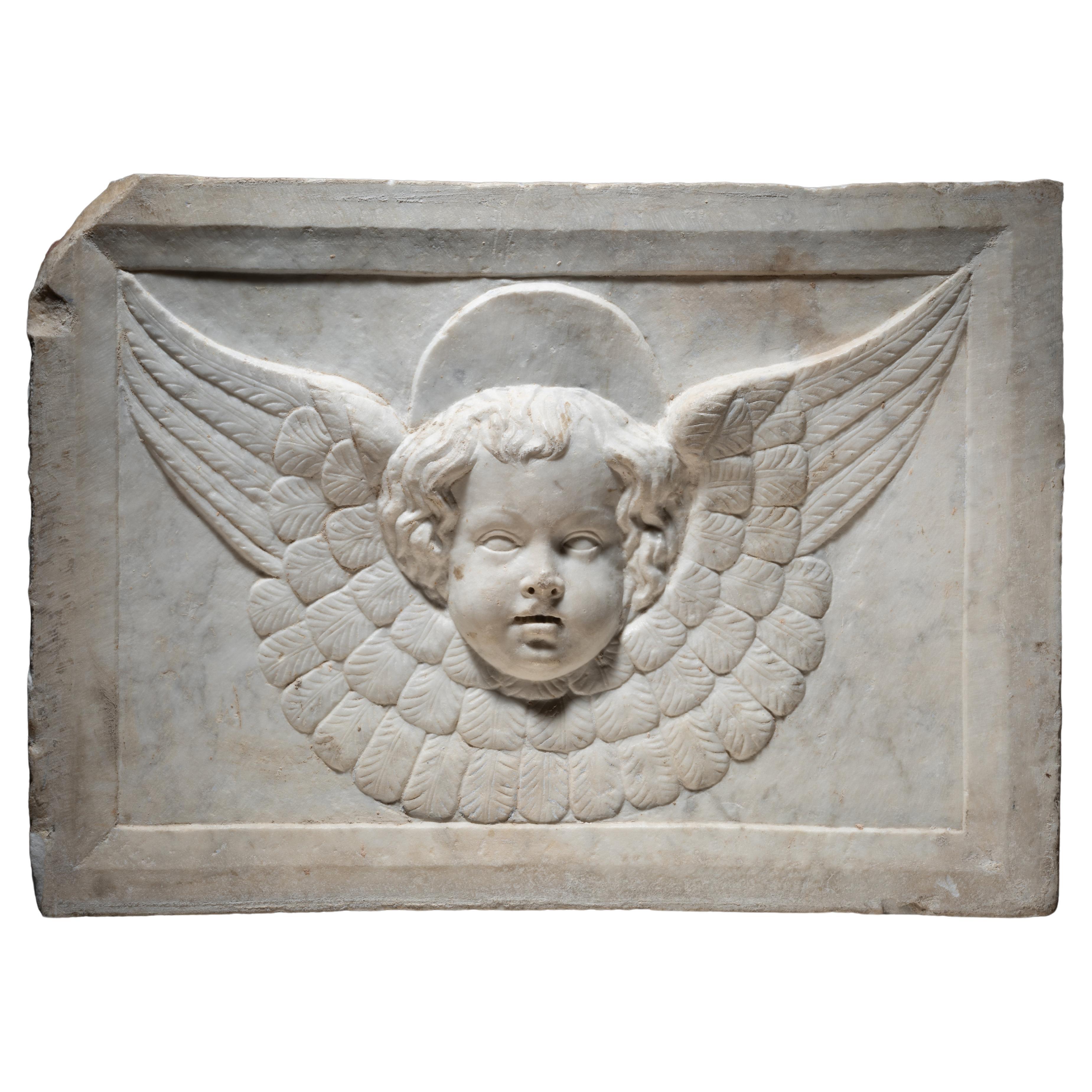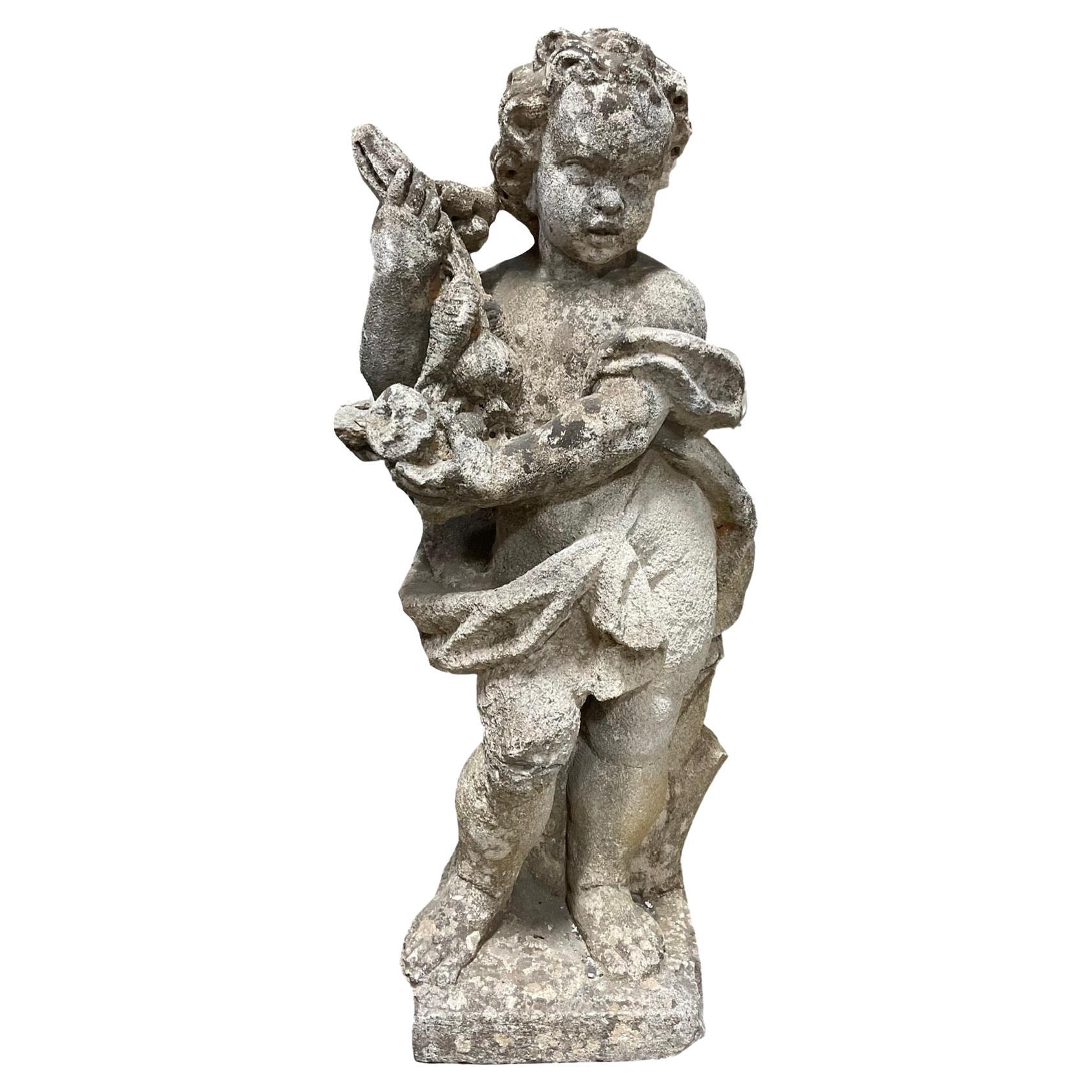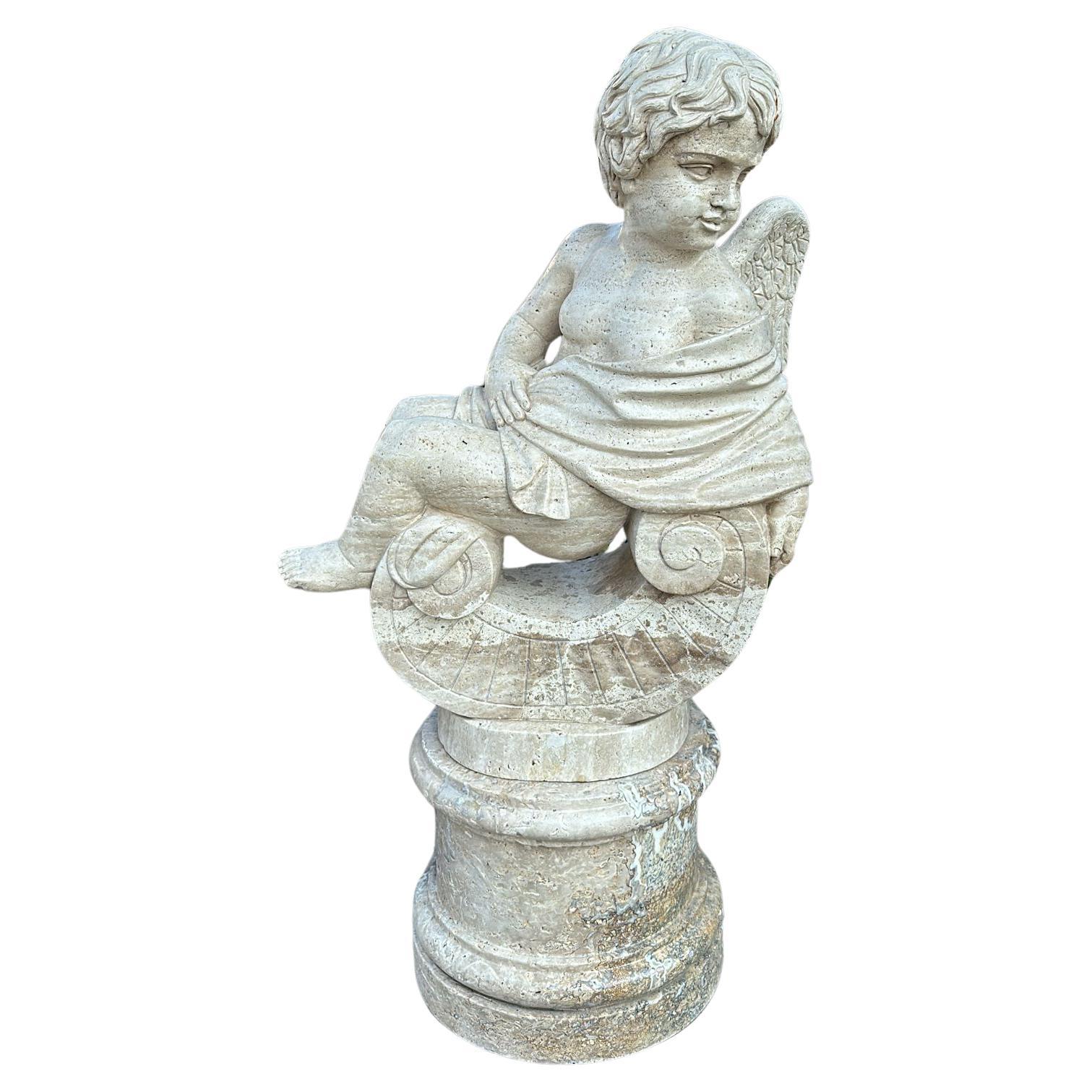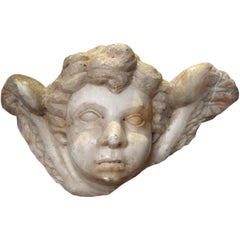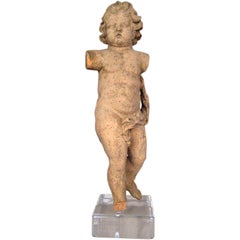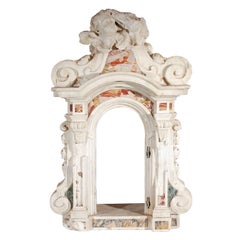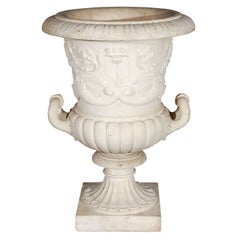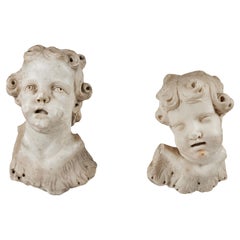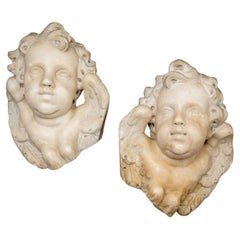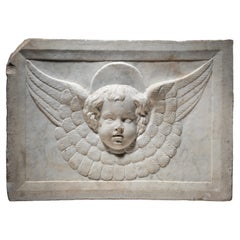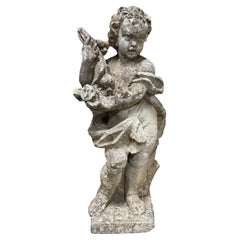Items Similar to Marble Cherub Surround
Want more images or videos?
Request additional images or videos from the seller
1 of 5
Marble Cherub Surround
$4,500
£3,412.16
€3,914.90
CA$6,402.95
A$6,945.75
CHF 3,652.46
MX$84,515.78
NOK 45,661.70
SEK 43,064.59
DKK 29,229.76
About the Item
Wonderful marble cherub surround depicting two putti, looking up to the dove of peace, on lucite. The cherub faces and dove are set upon green marble background. Mounted later on a Lucite base.
- Dimensions:Height: 11 in (27.94 cm)Width: 10 in (25.4 cm)Depth: 3.5 in (8.89 cm)
- Materials and Techniques:
- Place of Origin:
- Period:
- Date of Manufacture:1750
- Condition:Additions or alterations made to the original: It has been removed from what it was attached to and mounted on Lucite base. Wear consistent with age and use. The cherubs are in very good condition, there is some slight scuffing to the marble.
- Seller Location:Los Angeles, CA
- Reference Number:1stDibs: U0905058539103
About the Seller
4.9
Vetted Professional Seller
Every seller passes strict standards for authenticity and reliability
Established in 2000
1stDibs seller since 2008
89 sales on 1stDibs
Typical response time: 1 hour
- ShippingRetrieving quote...Shipping from: Los Angeles, CA
- Return Policy
Authenticity Guarantee
In the unlikely event there’s an issue with an item’s authenticity, contact us within 1 year for a full refund. DetailsMoney-Back Guarantee
If your item is not as described, is damaged in transit, or does not arrive, contact us within 7 days for a full refund. Details24-Hour Cancellation
You have a 24-hour grace period in which to reconsider your purchase, with no questions asked.Vetted Professional Sellers
Our world-class sellers must adhere to strict standards for service and quality, maintaining the integrity of our listings.Price-Match Guarantee
If you find that a seller listed the same item for a lower price elsewhere, we’ll match it.Trusted Global Delivery
Our best-in-class carrier network provides specialized shipping options worldwide, including custom delivery.More From This Seller
View All18th c., Marble Cherub Fragment
Located in Los Angeles, CA
Hand-carved, Northern Italian, winged, marble cherub's head mounted on a custom, Lucite base.
Category
Antique 18th Century Italian Statues
Materials
Marble
$5,580 Sale Price
40% Off
Carved Wood Statue of a Cherub
Located in Los Angeles, CA
18th c., hand-carved wood statue of a cherub mounted on a custom, Lucite base.
Category
Antique 18th Century and Earlier Italian Statues
Materials
Wood
Baroque Period, Italian, Marble Tabernacle
Located in Los Angeles, CA
Fabulous, hand-carved and veneered, 1700's, solid marble tabernacle from an Italian church altar. The scrolling, side pillars are surmounted by a ...
Category
Antique Early 18th Century Italian Baroque Religious Items
Materials
Marble
Italian Cararra Marble Urn
Located in Los Angeles, CA
Italian, marble urn with crisp carving featuring mythological creatures and floral motifs.
Category
20th Century Italian Urns
Materials
Marble
19th Century Marble Capital Fragment Mounted on Wooden Base
Located in Los Angeles, CA
Hand-carved marble capital fragment mounted on a wooden base. Base: 9.5" W x 7.5"D.
Category
Antique 19th Century French Mounted Objects
Materials
Marble
Mixed Marble Baptismal Font
Located in Los Angeles, CA
Large Baptismal font from Florence Italy with Sienna marble font and mixed marble base. Formerly owned by the Romano Family, a prominent family of antique dealers to the popes and r...
Category
Antique 1820s Italian Neoclassical Garden Ornaments
Materials
Marble, Siena Marble
$22,800
You May Also Like
18th Century, Marble Cherubs
Located in Los Angeles, CA
A pair of rare, early 1700’s, Roman, beautifully hand–carved, solid Carrara marble cherubim singing in adoration. Each with feather embellished robe fragments. Both mounted on custo...
Category
18th Century Figurative Sculptures
Materials
Marble
Baroque Marble Angel Heads, Italy, Mid-18th Century
Located in Greding, DE
Two marble angel heads with curly hair and hints of wings, designed in the opposite style.
Category
Antique Mid-18th Century Italian Baroque Figurative Sculptures
Materials
Marble
Cercle of Jacopo della Pila - Marble relief depicting a winged Cherub
Located in Bruxelles, BE
Cercle of Jacopo della Pila (Lombard, in Naples 1471-1502)
Marble relief depicting a winged Cherub
Naples, second half of15th century
40 x 57 x 12 cm
Exquisitely carved, this relief portrays a winged cherub with cascading hair and delicate features. The cherub's plump, smooth countenance, rounded cheeks, outlined lips, and finely drawn nose emanate a sense of tenderness. The quadrangular module, is adorned with a carved frame. The relief ascends gradually, transitioning from the low relief of the wings to the high relief of the head.
The rectangular frame and the subtly curved form of the artwork suggest that the relief likely adorned the upper part of an arch or a vaulted chapel. The type is that of the perspective room with a coffered ceiling decorated with figures of winged cherubs, which is found in various Neapolitan chapels of the 15th century. Coffered ceilings attest to the recovery of antiquity and the search for luxury in Renaissance architecture, first in Florence, then in Rome and Naples. The majority of the numerous family chapels and tombs built during the late fifteenth century in south of Italy employ the new formal vocabulary of the Florentine Renaissance in a self-confident manner that permitted a broad spectrum of variations.
The escalating admiration for the classical world, coupled with the development of perspective, significantly contributed to the Renaissance endorsement of coffered ceilings. This artistic and constructive device drew inspiration from the intricate marble patterns observed in historical landmarks such as the Arch of Titus, the Temple of Vesta in Tivoli, the Pantheon, and the Basilica of Maxentius. A distilled product of both mathematical and artistic cultures, deeply scrutinizing the ancient world, the coffered ceiling plays a vital role in the perspective construction of space with its regular and directional geometry. The motif of the coffered ceiling decorated with cherubs in relief was introduced in Naples by Francesco Laurana in the plastic decoration of the Arch of Castelnuovo. Laurana's impact on the art scene in the south of Italy was profound. The introduction of the winged cherub into the region's artistic vocabulary bridged the gap between the classical and the contemporary, creating a synthesis that resonated with both aesthetic and spiritual sensibilities. His influence extended beyond the immediate visual appeal, shaping the cultural identity of the Renaissance in southern Italy. Although the plastic decoration of the Arch of Castelnuovo cannot certainly be ascribed to a mature Renaissance style, it was precisely on this occasion that the sculptors who worked there could get to know and export throughout the Italian peninsula that type of "Florentine classicism" which, even in the 15th century Naples, was conditioned by the Burgundian culture imported into the Kingdom by Alfonso of Aragon himself, with artists called from Spain and Northern Europe. The coffered ceiling, with its geometric patterns and Laurana's winged cherubs nestled within, became a symbol of refinement and cultural sophistication. The relief sculptures, carefully integrated into the overall design, transformed the ceiling into a celestial realm, inviting viewers to contemplate the divine while immersed in the grandeur of the Renaissance space.
Similar winged cherubs appears also in the Naples cathedral. Within the renowned Succorpo Chapel, a mesmerizing marble coffered ceiling adorned with cherubs epitomizes the splendor of the Neapolitan Renaissance. The interplay of light and shadow on the textured surface of the marble coffered ceiling introduces an ethereal dimension, providing an immersive visual experience for observers. The geometric precision and the repeated patterns, reminiscent of classical motifs, establish a sense of harmony and balance that has become the hallmark of the Neapolitan interpretation of Florentine Renaissance aesthetics.
Although probably intended to be admired from a distance, this cherub is intricately detailed and exquisitely rendered: the face and hair are elegantly outlined and the feathers are textured through juxtaposed lines. The marble, both figurative and decorative, adheres to the principles of balance and restrained ornamentation typical of the « Florentine Classicism ». Harmonious shapes and gracefully orchestrated curves , rooted in the classical repertoire, converge to evoke a sense of ethereal beauty. The surface displays the masterful use of a chisel to intricately carve the feathers and facial features, creating an almost abstract quality.
This work is a testament to a sculptor of great skill and rich figurative knowledge, seamlessly blending classical firmness in contours with a refined treatment of the marble's surface. The combination of tradition and innovation point to a stylistic idiom from Lombardy, in particular we can find some comparaisons with the works of Jacopo della Pila, sculptor of Lombard origin working in Naples in the second half of the 15th century. He is documented there between 1471 and 1502, and is a protagonist of the Aragon Renaissance in the second half of the Quattrocento, together with the other great Northern sculptor active in the kingdom, Domenico Gagini.
the first commission he received dates back to August 9, 1471, when Jacopo publicly committed to sculpting the funerary monument of Archbishop Nicola Piscicelli to be placed in the Cathedral of Salerno. The last known work is an altar ordered on July 29, 1502, by the noble Jacopo Rocco for the church of San Lorenzo Maggiore in Naples. Between these two chronological extremes (1471-1502), we must place the fervent activity of the artist, who had trained in Rome, perhaps under the guidance of Paolo Romano but also engaged in dialogue with other major artists of the city, especially Isaia da Pisa. He enriched his experience in Naples, initially drawing inspiration from the works of Domenico Gagini and later from the Tuscan masterpieces of Antonio Rossellino and Benedetto da Maiano destined for the church of Santa Maria di Monteoliveto. Jacopo della Pila's artistic personality is thus based on a complex interplay of influences, contributing to the definition of a highly personal style.
Close comparaison can be made between our cherub and the winged angels reliefs...
Category
Antique 15th Century and Earlier Italian Renaissance Figurative Sculptures
Materials
Marble
$22,986 Sale Price
20% Off
English Limestone Cherub Sculpture
Located in Dallas, TX
Bring a touch of history to your décor with this English Limestone Cherub Sculpture, crafted from durable limestone in 1890. This intricate carving of...
Category
Antique 18th Century Statues
Materials
Limestone
Charming Garden Marble Cherub Sculptures
Located in Madrid, ES
Transform your garden into a serene haven with this enchanting set of garden stone sculptures, each beautifully representing a cherub. These charming pieces, standing at 120 cm tall,...
Category
20th Century Statues
Materials
Marble
Swedish 20th Century Marble Cherub Statue
Located in Atlanta, GA
This Swedish 20th-century marble cherub statue exudes timeless charm and elegance, making it a delightful decorative piece. The sculpture depicts a cherub sitting atop a flowing base...
Category
20th Century Swedish Neoclassical Revival Figurative Sculptures
Materials
Marble
More Ways To Browse
19th Century Italian Sculpture
Tiger Furniture
Vintage Porcelain Sculptures
Mid Century American Carved Furniture
Made In Austria
French Bronze Figurative Sculpture 19th Century
19th Century French Marble Sculpture
Signed Marble
Antique Mineral
Carved Onyx
Vintage Glass Animals
Bronze Sculpture Signed
Antique Goddess
Cherub Furniture
Horse Sculptures
Dancing Sculpture
Brazil Sculpture
Animals In Sculpture
